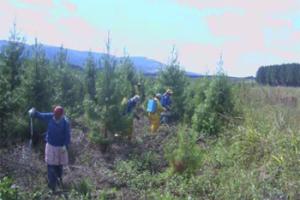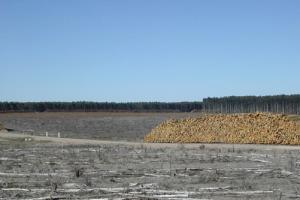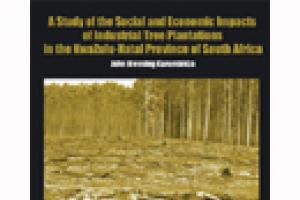As part of a two-year process to review FSC policy on the certification of timber plantations, members of the policy review working-group (PWG) recently visited South Africa for their final meeting. What follows are some quotes from the report on the field trip to visit plantation areas, produced by Wally Menne (member of the local Timberwatch Coalition).
The Green Economy
The Green Economy is a tactic used to “clean up” the image of corporations rather than address corporate capture and capitalism as the true drivers of deforestation. False solutions promoted under the Green Economy include certification, sustainable forest management, ecosystem services, REDD+, the bioeconomy, nature-based climate solutions, and zero net deforestation. Rather than stopping it, these “solutions” support corporate-driven destruction that is causing a deep social and ecological crisis.
Bulletin articles
7 April 2006
Bulletin articles
7 April 2006
When the British invaded India 250 years ago, they found the sub-continent covered with a mosaic of vegetation they did not comprehend. Tall dark trees, gnarled and knotted creepers, wild grasslands…the sheer tropical abundance of India’s forests shocked, overwhelmed them. Ultimately, forests came to signify a number of simpler issues (or things): snakes, tigers, barbarians/rebels, pests, and adventure. British colonizers/traders never neglected the mundane and practical, though, which lay beyond this ‘exotic’ and ‘orient’.
Bulletin articles
7 April 2006
Another new FSC certificate of a major logging operation, this time in Indonesia, has got forest watchers scratching their heads.
Bulletin articles
7 April 2006
A new FSC certificate of a major logging operation has again raised eyebrows among foresters, environmentalists and human rights activists. In Guyana, the Swiss certification company SGS Qualifor has just granted an FSC certificate to the Malaysian-Korean logging giant, Barama Company Limited (BCL), which operates a 1.69 million hectare concession in North West Guyana.
Other information
5 April 2006
Only in available in Spanish -
Por Javier Baltodano - Grupo de Trabajo en la Revisión de las Políticas de Certificación a Grandes Plantaciones FSC .
Introducción:
Other information
14 March 2006
By Ricardo Carrere -
Other information
7 March 2006
Eucalyptus, pine, acacia, gmelina, teak, oil palm plantations have become a major social and environmental problem. From a biodiversity perspective they eliminate most local plants and provide almost no food to wildlife. Some plantation species become invasive, thus encroaching on natural ecosystems. In spite of this, they continue to be promoted, particularly in the South, for the production of cheap raw material mainly for the pulp/paper and palm oil industries.
Bulletin articles
7 March 2006
In many cases, forest destruction has created situations of such gravity that company managers and officials -finding themselves cornered by complaints, social pressure or pressure from business sectors whose interests are threatened by the discredit of their activities- are developing their own discourse regarding environmental solutions.
Bulletin articles
8 February 2006
For many years people have been hearing about climate change and the terrible impacts it would entail. In spite of warnings of the pending disaster, a group of scientists in the service of corporate interests has been trying to cast doubts on the scientific evidence. At the same time, another group of academics and technocrats has been inventing absurd mechanisms to “compensate” for carbon emissions in order to allow fossil fuel use to continue. Among these mechanisms are large-scale plantations of fast growing trees – located in the South, of course.
Bulletin articles
8 January 2006
Over the past two years I have made an uncomfortable discovery. Like most environmentalists, I have been as blind to the constraints affecting our energy supply as my opponents have been to climate change. I now realise that I have entertained a belief in magic.
Bulletin articles
8 January 2006
Perhaps no other Bill in Colombia on environmental matters has given rise to such diverse opinions and to such commotion as the discussion in the Colombian Congress of the General Forestry Law adopted by this institution last December. The strength of the arguments and the response of Colombian environmentalism, social movements and even part of the mass media have been such that for the first time President Alvaro Uribe Velez returned a Bill to the Congress of the Republic.
Publications
25 December 2005
By John Blessing Karumbidza



